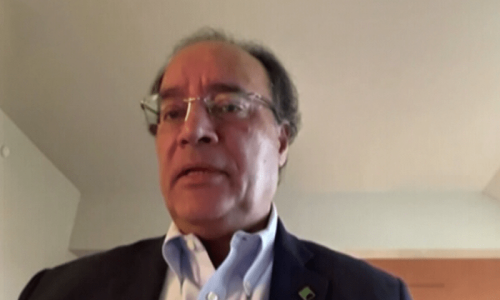ISLAMABAD/KARACHI: Federal Minister for Finance and Revenue Muhammad Aurangzeb on Thursday said that fundamental economic reforms were needed to make the existing IMF programme the last one for the country.
Transformation of economy into an export-driven one necessitates structural reforms, only then could the country move forward in the next three years, the minister said in an interview with Voice of America after the IMF approved $7 billion loan for Pakistan.
The minister said the government had no choice but to implement economic reforms, which included bringing sectors currently outside the tax net into the fold.
He said that the burden on salaried and manufacturing classes would be reduced, and highlighted the need to bring into tax net the retailers, wholesalers, agriculture, and property sectors. He said that despite a 29 per cent increase in revenues last year, the tax-to-GDP ratio remained at 9pc, which is insufficient to stabilise any country’s economy.
Business community expresses cautious optimism over new loan agreement
He mentioned that the government was abolishing the term “non-filer” and would impose restrictions on tax evaders, limiting their ability to conduct various activities.
He noted that the government possessed data on individuals’ lifestyles, including the number of vehicles owned, international travel, and other expenditures. This information will enable the Federal Board of Revenue (FBR) to bring tax evaders into the tax net without arrest, he added. Senator Aurangzeb said Pakistan’s undocumented economy had been valued at Rs9 trillion, which needed to be documented.
Challenges ahead?
Meanwhile, businessmen have expressed cautious optimism over the IMF deal. They said this has cleared uncertainties to some extent, but will bring more challenges for the country’s economic recovery.
The CEO and Secretary General of Overseas Investors Chamber of Commerce and Industry, M. Abdul Aleem said the agreement requires the government to deliver on some seriously stretched targets on tax revenue, spending, and getting out of running the SOEs. He pointed out that these issues have not been addressed at this level in the past, especially tax collection from trade and agriculture.
He said there was a concern among compliant business stakeholders that failure to timely deliver on revenue targets may cause additional cost burden and may affect their sustainability.
Mr Aleem expressed the hope that the government would avoid the need for ad hoc measures.
Pakistan Business Council CEO Ehsan A. Malik said the IMF programme would provide Pakistan with liquidity and another window of opportunity to address fundamental flaws in economy.
This time, he added, the country’s resolve to undertake the required reforms would be tested at a higher level as the previous programmes had deepened the trust deficit in the government’s ability to deliver on critical targets.
The formal sector will carry a heavier brunt of the burden, he said in a statement. “That said, commodity tailwinds, increasing remittances, falling inflation, and declining borrowing costs will positively impact the current and fiscal accounts,” he pointed out.
However, the tax target will be difficult to achieve until demand revives. Pending this the formal sector would be expected to contribute more, the PBC official said, adding that FBR was already sharpening its claws to extract more from top taxpayers as it considered it easier than broadening the tax base.
The government’s challenge is executing PIA’s privatisation and resisting any calls to go easy on broadening the tax base to include traders, transporters, and real estate, he said. On energy, however, the likelihood of any meaningful cost reduction remains low, and the IMF’s tariff-led prescription will continue to thwart the competitiveness of industry and exports.
In summary, Mr Ehsan said, the IMF provides a much-needed boost to the country’s forex reserves.
However, he noted, its relatively short-term, front-loaded targets are not necessarily sustainable solutions to broadening the tax base, equitably distributing the tax burden, or making the fiscal regime investment-friendly. Nor is its tariff-led prescription a viable alternative to fundamental reforms of the energy sector. These are major reforms for the country to take on its own.
To its credit, the IMF has been a significant influencer in obtaining the provinces’ agreement to tax agriculture.
Published in Dawn, September 27th, 2024















































Dear visitor, the comments section is undergoing an overhaul and will return soon.